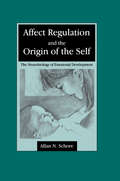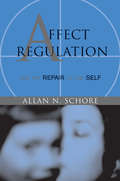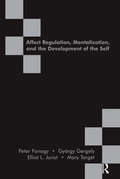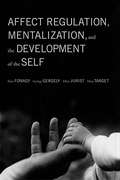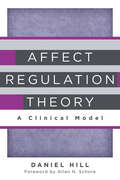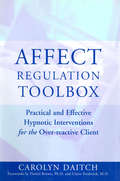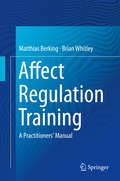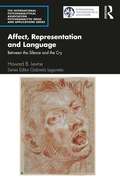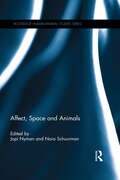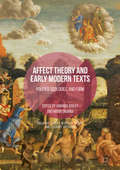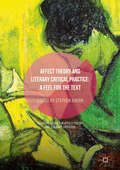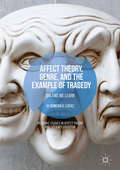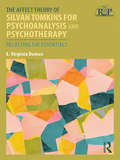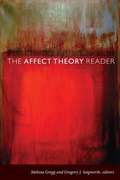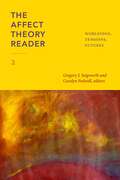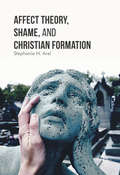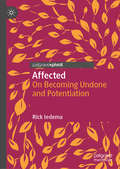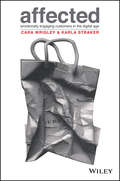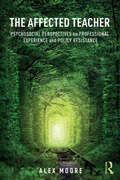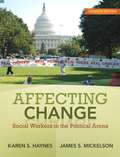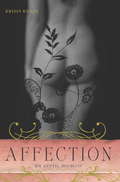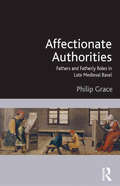- Table View
- List View
Affect Regulation and the Origin of the Self: The Neurobiology of Emotional Development
by Allan N. SchoreDuring the past decade a diverse group of disciplines have simultaneously intensified their attention upon the scientific study of emotion. This proliferation of research on affective phenomena has been paralleled by an acceleration of investigations of early human structural and functional development. Developmental neuroscience is now delving into the ontogeny of brain systems that evolve to support the psychobiological underpinnings of socioemotional functioning. Studies of the infant brain demonstrate that its maturation is influenced by the environment and is experience-dependent. Developmental psychological research emphasizes that the infant's expanding socioaffective functions are critically influenced by the affect-transacting experiences it has with the primary caregiver. Concurrent developmental psychoanalytic research suggests that the mother's affect regulatory functions permanently shape the emerging self's capacity for self-organization. Studies of incipient relational processes and their effects on developing structure are thus an excellent paradigm for the deeper apprehension of the organization and dynamics of affective phenomena. This book brings together and presents the latest findings of socioemotional studies emerging from the developmental branches of various disciplines. It supplies psychological researchers and clinicians with relevant, up-to-date developmental neurobiological findings and insights, and exposes neuroscientists to recent developmental psychological and psychoanalytic studies of infants. The methodology of this theoretical research involves the integration of information that is being generated by the different fields that are studying the problem of socioaffective development--neurobiology, behavioral neurology, behavioral biology, sociobiology, social psychology, developmental psychology, developmental psychoanalysis, and infant psychiatry. A special emphasis is placed upon the application and incorporation of current developmental data from neurochemistry, neuroanatomy, neuropsychology, and neuroendocrinology into the main body of developmental theory. More than just a review of several literatures, the studies cited in this work are used as a multidisciplinary source pool of experimental data, theoretical concepts, and clinical observations that form the base and scaffolding of an overarching heuristic model of socioemotional development that is grounded in contemporary neuroscience. This psychoneurobiological model is then used to generate a number of heuristic hypotheses regarding the proximal causes of a wide array of affect-related phenomena--from the motive force that drives human attachment to the proximal causes of psychiatric disturbances and psychosomatic disorders, and indeed to the origin of the self.
Affect Regulation and the Repair of the Self (Norton Series on Interpersonal Neurobiology)
by Allan N. SchoreThis volume (one of two) is the first presentation of Schore's comprehensive theory in book form, as it has developed since 1994. In 1994 Allan Schore published his groundbreaking book, Affect Regulation and the Origin of the Self, in which he integrated a large number of experimental and clinical studies from both the psychological and biological disciplines in order to construct an overarching model of social and emotional development. Since then he has expanded his regulation theory in more than two dozen articles and essays covering multiple disciplines, including neuroscience, psychiatry, psychoanalysis, developmental psychology, attachment, and trauma. Affect Regulation and the Repair of the Self contains chapters on neuropsychoanalysis and developmentally oriented psychotherapy. It is absolutely essential reading for all clinicians, researchers, and general readers interested in normal and abnormal human development.
Affect Regulation, Mentalization and the Development of the Self
by Peter Fonagy Guörgy Gergely Elliot L. Jurist Mary TargetThis book focuses on the crucial importance of developmental work to psychotherapy and psychopathology. It offers an account of psychotherapy to integrate scientific knowledge of psychological development and represents psychological states in the minds of infants, children, adolescents, and adults.
Affect Regulation, Mentalization, and the Development of the Self
by Peter Fonagy Elliot Jurist Gyorgy Gergely Mary TargetWinner of the 2003 Gradiva Award and the 2003 Goethe Award for Psychoanalytic Scholarship. Arguing for the importance of attachment and emotionality in the developing human consciousness, four prominent analysts explore and refine the concepts of mentalization and affect regulation. Their bold, energetic, and encouraging vision for psychoanalytic treatment combines elements of developmental psychology, attachment theory, and psychoanalytic technique. Drawing extensively on case studies and recent analytic literature to illustrate their ideas, Fonagy, Gergely, Jurist, and Target offer models of psychotherapy practice that can enable the gradual development of mentalization and affect regulation even in patients with long histories of violence or neglect.
Affect Regulation Theory: A Clinical Model (Norton Series on Interpersonal Neurobiology)
by Allan N. Schore Daniel HillThe rich, complex theory of affect regulation boiled down into a clinically useful guide. Affect regulation theory—the science of how humans regulate their emotions—is at the root of all psychotherapies. Drawing on attachment, developmental trauma, implicit processes, and neurobiology, major theorists from Allan Schore to Daniel Stern have argued how and why regulated affect is key to our optimal functioning. This book translates the intricacies of the theory into a cogent clinical synthesis. With clarity and practicality, Hill decodes the massive body of contemporary research on affect regulation, offering a comprehensible and ready-to-implement model for conducting affect regulation therapy. The book is organized around the four domains of a clinical model: (1) a theory of bodymind; (2) a theory of optimal development of affect regulation in secure attachment relationships; (3) a theory of pathogenesis, in which disordered affect regulation originates in relational trauma and insecure attachment relationships; and (4) a theory of therapeutic actions targeted to repair the affect regulating systems. The key themes of Hill’s affect-focused approach include: how and why different patterns of affect regulation develop; how regulatory patterns are transmitted from caretakers to the infants; what adaptive and maladaptive regulatory patterns look like neurobiologically, psychologically, and relationally; how deficits in affect regulation manifest as psychiatric symptoms and personality disorders; and ultimately, the means by which regulatory deficits can be repaired. Specific chapters explore such subjects as self states, mentalization, classical and modern attachment theory, relational trauma (and its manifestations in chronic dissociation, personality disorders, and pervasive dissociated shame), supporting self-development in therapy, patient–therapist attunement, implicit and explicit therapeutic actions, and many more.
Affect Regulation Toolbox: Practical And Effective Hypnotic Interventions for the Over-Reactive Client
by Carolyn DaitchUsing hypnotic techniques to facilitate successful therapy. Rational judgment, soothing behavior, and calm observation often go out the window when responding to stress. This book presents hypnotherapeutic skills (including breathing exercises) and other easy-to-learn techniques that help people maintain healthy responses to stress and facilitate effective clinical work and a happier life.
Affect Regulation Training: A Practitioners' Manual
by Matthias Berking Brian WhitleyEmotion Regulation is currently one of the most popular topics in clinical psychology. Numerous studies demonstrate that deficits in emotion regulation skills are likely to help maintain various forms of psychological disorders. Thus, enhancing emotion regulation has become a major target in psychotherapeutic treatments. For this purpose, a number of therapeutic strategies have been developed and shown to be effective. However, for practitioners it is often difficult to decide which of these strategies they should use or how they can effectively combine empirically-validated strategies. Thus, the authors developed the Affect Regulation Training as a transdiagnostic intervention which systematically integrates strategies from cognitive behavior therapy, mindfulness-based interventions, emotion-focused therapy, and dialectical behavioral therapy. The effectiveness of ART has been demonstrated in several high-quality studies.
Affect, Representation and Language: Between the Silence and the Cry (The International Psychoanalytical Association Psychoanalytic Ideas and Applications Series)
by Howard B. LevineThis book presents and elaborates on the rationale and implications of the transformational dimension of psychoanalysis. In so doing, it attempts to extend psychoanalytic theory and practice beyond neurosis and beyond what were formerly thought to be the limits of analytic understanding. Its theoretical vision sits at the crossroads of the thinking of Freud, Bion, Winnicott, Green and the Paris Psycho-Somatic School. Other sources include the contributions of contemporary French psychoanalysts such as Laplanche, Donnet, L. Kahn, P. Miller and the Botellas, along with the work of Alvarez, Scarfone, Ferro, Ogden, and more. In re-examining the very epistemological foundations of psychoanalysis and their implications for a theory of psychic functioning, it follows upon and extends the radical implications of Freud’s 1937 Constructions paper, the thoughts of Bion on intuition and Winnicott’s understanding of the working through of the consequences of early pre-verbal environmental failure. In so doing, it makes a case for psychoanalysis as a powerful treatment for borderline, primitive narcissistic, post-traumatic and other character disorders and conditions – including perversions, addictions, psychosomatic, autistic and panic disorders. By presenting a revised metapsychology that is Freudian, contemporary and clinically near, Affect, Representation and Language. Between the Silence and the Cry offers practitioners at all levels of analytic experience a way of understanding and treating the expanding range of patients and disorders that present for treatment in our modern era.
Affect, Space and Animals (Routledge Human-Animal Studies Series)
by Jopi Nyman Nora SchuurmanIn recent years, animals have entered the focus of the social and cultural sciences, resulting in the emergence of the new field of human-animal studies. This book investigates the relationships between humans and animals, paying particular attention to the role of affect, space, and animal subjectivity in diverse human-animal encounters. Written by a team of international scholars, contributions explore current debates concerning animal representation, performativity, and relationality in various texts and practices. Part I explores how animals are framed as affective, through four case studies that deal with climate change, human-bovine relationships, and human-horse interaction in different contemporary and historical contexts. Part II expands on the issue of relationality and locates encounters within place, mapping the different spaces where human-animal encounters take place. Part III then examines the construction of animal subjectivity and agency to emphasize the way in which animals are conscious and sentient beings capable of experiencing feelings, emotions, and intentions, and active agents whose actions have meaning for the animals themselves. This book highlights the importance of the ways in which affect enables animal agency and subjectivity to emerge in encounters between humans and animals in different contexts, leading to different configurations. It contributes not only to debates concerning the role of animals in society but also to the epistemological development of the field of human-animal studies.
Affect Theory and Early Modern Texts: Politics, Ecologies, and Form (Palgrave Studies in Affect Theory and Literary Criticism)
by Amanda Bailey Mario DigangiThe first book to put contemporary affect theory into conversation with early modern studies, Affect Theory and Early Modern Texts: Politics, Ecologies, and Form demonstrates how questions of affect illuminates issues of cognition, political agency, historiography, and scientific thought in early modern literature and culture. Engaging various historical and theoretical perspectives, the essays in this volume bring affect to bear on early modern representations of bodies, passions, and social relations by exploring: the role of embodiment in political subjectivity and action; the interactions of human and non-human bodies within ecological systems; and the social and physiological dynamics of theatrical experience. Examining the complexly embodied experiences of leisure, sympathy, staged violence, courtiership, envy, suicide, and many other topics, the contributors open up new ways of understanding how Renaissance writers thought about the capacities, pleasures, and vulnerabilities of the human body.
Affect Theory and Literary Critical Practice: A Feel for the Text (Palgrave Studies in Affect Theory and Literary Criticism)
by Stephen AhernAffect Theory and Literary Critical Practice develops new approaches to reading literature that are informed by the insights of scholars working in affect studies across many disciplines, with essays that consider works of fiction, drama, poetry and memoir ranging from the medieval to the postmodern. While building readings of representative texts, contributors reflect on the value of affect theory to literary critical practice, asking: what explanatory power is affect theory affording me here as a critic? what can the insights of the theory help me do with a text? Contributors work to incorporate lines of theory not always read together, accounting for the affective intensities that circulate through texts and readers and tracing the operations of affectively charged social scripts. Drawing variously on queer, feminist and critical race theory and informed by ecocritical and new materialist sensibilities, essays in the volume share a critical practice founded in an ethics of relation and contribute to an emerging postcritical moment.
Affect Theory, Genre, and the Example of Tragedy: Dreams We Learn (Palgrave Studies in Affect Theory and Literary Criticism)
by Duncan A. LucasAffect Theory, Genre, and the Example of Tragedy employs Silvan Tomkins’ Affect-Script theory of human psychology to explore the largely unacknowledged emotions of disgust and shame in tragedy. The book begins with an overview of Tomkins’ relationship to both traditional psychoanalysis and theories of human motivation and emotion, before considering tragedy via case studies of Oedipus, Hamlet, and Death of a Salesman. Aligning Affect-Script theory with literary genre studies, this text explores what motivates fictional characters within the closed conditions of their imagined worlds and how we as an audience relate to and understand fictional characters as motivated humans.
The Affect Theory of Silvan Tomkins for Psychoanalysis and Psychotherapy: Recasting the Essentials (Relational Perspectives Book Series)
by E. Virginia DemosThe Affect Theory of Silvan Tomkins for Psychoanalysis and Psychotherapy explores central issues in current clinical work, using the theories put forward by Silvan Tomkins and presenting them in detail, as well as integrating them with the most up-to-date neuroscience findings and infancy research, all based on a biopsychosocial, dynamic systems approach.Part I describes the essentials of life, based on our evolutionary and biological heritage, namely a need for a coherent understanding of one’s world and the capacity to act in that world; the infant's capacities are described in detail as embodying both. Longitudinal data is provided beginning at birth into the third year of life. Part II reviews current debates in psychoanalysis relating to motivation, and the lack of an internally consistent theory. Recent neuroscience findings are presented, which both negate drive theory, and support Tomkins' theory. His theory is then described in detail. In Part III, two case histories are presented: one is a clinical case illustrating one of Tomkins' affect powered scripts. The second case is drawn from a longitudinal study extending from birth, into early adulthood, which is made sense of with the help of Tomkins' theory. Demos concludes with a look at competing approaches to theory and responds to recent cognitive-based attempts to disprove both Tomkins' work and the latest findings from neuroscience. The Affect Theory of Silvan Tomkins for Psychoanalysis and Psychotherapy will appeal to psychoanalysts and psychoanalytic psychotherapists, as well as psychiatrists, psychologists, social workers, and psychiatric nurses.
The Affect Theory Reader
by Melissa Gregg Gregory J. SeigworthThis field-defining collection consolidates and builds momentum in the burgeoning area of affect studies.
The Affect Theory Reader 2: Worldings, Tensions, Futures (ANIMA: Critical Race Studies Otherwise)
by Gregory J. Seigworth and Carolyn PedwellBuilding on the foundational Affect Theory Reader, this new volume gathers together contemporary scholarship that highlights and interrogates the contemporary state of affect inquiry. Unsettling what might be too readily taken-for-granted assumptions in affect theory, The Affect Theory Reader 2 extends and challenges how contemporary theories of affect intersect with a wide range of topics and fields that include Black studies, queer and trans theory, Indigenous cosmologies, feminist cultural analysis, psychoanalysis, and media ecologies. It foregrounds vital touchpoints for contemporary studies of affect, from the visceral elements of climate emergency and the sensorial sinews of networked media to the minor feelings entangled with listening, looking, thinking, writing, and teaching otherwise. Tracing affect’s resonances with today’s most critical debates, The Affect Theory Reader 2 will reorient and disorient readers to the past, present, and future potentials of affect theory.Contributors. Lauren Berlant, Lisa Blackman, Rizvana Bradley, Ann Cvetkovich, Ezekiel J. Dixon-Román, Adam J. Frank, M. Gail Hamner, Omar Kasmani, Cecilia Macón, Hil Malatino, Erin Manning, Derek P. McCormack, Patrick Nickleson, Susanna Paasonen, Tyrone S. Palmer, Carolyn Pedwell, Jasbir K. Puar, Jason Read, Michael Richardson, Dylan Robinson, Tony D. Sampson, Kyla Schuller, Gregory J. Seigworth, Nathan Snaza, Kathleen Stewart, Elizabeth A. Wilson
Affect Theory, Shame, and Christian Formation
by Stephanie N. ArelThis book addresses the eclipse of shame in Christian theology by showing how shame emerges in Christian texts and practice in ways that can be neither assimilated into a discourses of guilt nor dissociated from embodiment. Stephanie N. Arel argues that the traditional focus on guilt obscures shame by perpetuating the image of the lonely sinner in guilt. Drawing on recent studies in affect and attachment theories to frame the theological analysis, the text examines the theological anthropological writings of Augustine and Reinhold Niebuhr, the interpretation of empathy by Edith Stein, and moments of touch in Christian praxis. Bringing the affective dynamics of shame to the forefront enables theologians and religious leaders to identify where shame emerges in language and human behavior. The text expands work in trauma theory, providing a multi-layered theological lens for engaging shame and accompanying suffering.
Affected: On Becoming Undone and Potentiation
by Rick IedemaThis book explores the implications and relevancies of personal affect and organisational complexity for navigating organisational processes, relationships, changes and aspirations. In today’s climate, worker roles, relations and responsibilities are becoming increasingly complex and variable. Using personal experiences of organisational conflict as a point of departure, this book reflects on organisational change, complexity and research.It moves from experiential towards theoretical and methodological issues, exploring the question of how to confront and intervene in organisational complexity. Among others, the main theories brought to bear on this question include complexity theory, affect theory and sphere theory (or ‘spherology’). The research approaches and methodologies discussed include anthropology/ethnography, discourse studies, visual research and (the turn to) participatory enquiry.The book’s main message is to advocate for a collaborative, affective, visualised and future-oriented research agenda that rejects the conventional objectivist break and ‘division of learning’ characterising researcher-researched relationships. It will appeal to students and academics working in the fields of alternative research methods, the social sciences, organisational studies and management theory.
Affected: Emotionally Engaging Customers in The Digital Age
by Cara Wrigley Karla StrakerHow can you create meaningful connections with customers in the digital space? The rapid emergence of new technologies has revolutionized the way companies build relationships and interact with their customers. Today, it’s more important than ever to have an emotional understanding of customers and how they feel about a product, service, or business, even when your primary interactions are via digital channels. Affected goes beyond influencing behaviors to understanding cognition and emotion as a way to better connect with customers in the digital space. In it, Wrigley and Straker offer a new approach—one that examines channel relationships and useful concepts for clarifying and refining the emotional meaning behind company strategy and their relationship to corresponding channels. Using case study examples from and over a decade of primary research in the area, they discuss the process and impact of such emotionally aware channel designs. Spanning entrepreneurial start-up techniques of wunderkind artist Cj Hendry through to the lucrative retail sector of luxury brand Burberry, this seminal book offers multi-channel design approach that can show companies how to select, design, and maintain digital engagements based on their strategy and industry needs. Shows businesses how they can better understand and engage with customers digitally Demonstrates how to gain competitive advantage by integrating design methods into corporate strategy Provides multi-channel approaches for how businesses can select, design, and maintain digital engagements Establishes a clear framework for analysing and applying the right strategy for your digital engagement Connecting and engaging with customers is pivotal to business success, but in the digital space the old methods just won’t cut it. With Affected, you’ll find the tools and techniques you need to find your customers where they are.
Affected Labour in a Café Culture: The Atmospheres and Economics of 'Hip' Melbourne (Routledge Research in Culture, Space and Identity)
by Alexia CameronWhat does it mean to work in the ‘hip’ postmodern economy? This book develops the concept of ‘affected labour’ within Melbourne, Australia. Through the lens of café and bar culture, the book provides an ethnographic investigation into the ways that affect arises, circulates, sticks and dissipates over the course of everyday encounters. The dynamics and atmospheres of affective labour among those working in the hospitality-oriented environments are unfolded. Service work is rooted in the notion that labour is ‘performed’ by an exhausted worker for a demanding customer. This book goes beyond this idea by describing the way not only consumers are moved by the experience and seduced by the atmosphere, but more pressingly workers and employers. This book reveals the ways in which workers themselves are capitalised on by being affected pleasurably in the moment, fuelling an economy of short-term desires in which ‘affected labourers’ are manipulated.
The Affected Teacher: Psychosocial Perspectives on Professional Experience and Policy Resistance
by Alex MooreAt a time when teaching and learning policy too often presents itself in a simplistic input-output language of measurable targets and objectives, The Affected Teacher explores the role played by emotionality in how professional life is experienced by school teachers. The book argues that, in the very highly organised and structured social spaces of public institutions, emotionality - or, more precisely, all that is included in the concept of ‘affect’ - needs to be recognised and validated, rather than ignored or pathologised. It explores how neoliberal education policy seeks to mould professional subjectivities, relationships and practices; how teachers experience and ‘manage’ their feelings; and the role that affect plays in guiding either compliance with or resistance to often unpopular policy directives. Drawing on a rich body of original data comprising formal and informal discussions with a range of teachers, the case is argued for psychoanalytically and politically informed individual and group reflexivity, both as a form of professional and personal development and as a way of keeping alive alternative beliefs and understandings regarding the purposes of education. The Affected Teacher is relevant to practising schoolteachers and to undergraduate and graduate students and academics involved in education related courses such as policy studies, education management and the sociology of education, as well as disciplines related to psychosocial studies and psychoanalysis.
Affecting Change: Social Workers in the Political Arena
by Karen S. Haynes James S. MickelsonUpdated to reflect advances in a changing political arena of Obama's administration, this revision shows students how to develop political action skills and to take advantage of the opportunity of change. This practical, step-by-step guide focuses on advocacy as the central mission of social work practice. New material and 17 new personal scenarios involving social workers who have made a difference-senators, representatives, and officials in the political arena-serve to inspire students. Revised chapters show how social work skills can be most effective, whether by impacting the political arena as a social worker or running for office.
Affecting Grace
by Kenneth C. CalhoonAffecting Grace examines the importance of Shakespeare's poetry and plays within German literature and thought after 1750 - including its relationship to German classicism, which favoured unreflected ease over theatricality. Kenneth S. Calhoon examines this tension against an extensive backdrop that includes a number of canonical German authors - Goethe, Schiller, Herder, Lessing, von Kleist, and Nietzsche - as well as the advent of Meissen porcelain, the painting of Bernardo Bellotto and Francesco Guardi, and aspects of German styles of architecture.Extending from Shakespeare's The Merchant of Venice (c. 1597) to Kleist's The Broken Jug (1806), this study turns on the paradox that the German literary world had begun to embrace Shakespeare just as it was firming up the broad but pronounced anti-Baroque sensibility found pivotally in Lessing's critical and dramatic works. Through these investigations, Calhoon illuminates the deep cultural changes that fundamentally affected Germany's literary and artistic traditions.
Affection: An Erotic Memoir
by Krissy KneenKrissy Kneen loves sex . . . and she's not afraid to talk about it. In this sometimes hilarious, sometimes poignant, and sometimes terrifying memoir, she traces the arc of her sexual life - from her childhood in a sexless household to the myriad sexual encounters of her young and adult life to the present, in which she is a married (and monogamous) 40-year-old woman. Raised by a group of protective and eccentric women who expressly forbade any and every sign of sexuality, Krissy - an unusually sensual young girl - discovered early on that illicit pleasures are the best kind. Affection follows the path of Kneen's life journey, from the compulsive sexual self-exploration of her childhood to her experiences as a young woman for whom the world is a sexual playground. Underlying the jaw-dropping details of her many sexual escapades is Kneen's examination of how her sense of self shapes and is shaped by those experiences, and of her struggle to satisfy her own needs in the face of a limiting, and often judgmental, society. Affection is a frank, often erotic look at one woman's sexuality as she grows and changes in a world that continues to see only the young and the beautiful amongst us as sexual beings - and a chronicle of her refusal to conform to that misconception.
Affection and Trust: The Personal Correspondence of Harry S. Truman and Dean Acheson, 1953-1971
by Dean Acheson Harry S. TrumanPublished for the first time: the personal letters of President Harry S. Truman and his secretary of state, Dean Acheson, from 1953, the year when both were newly out of office, until Acheson's death at the age of 78 in 1971.
Affectionate Authorities: Fathers and Fatherly Roles in Late Medieval Basel
by Philip GraceIn one of his sermons, the medieval preacher Bernardino of Siena listed seven ’fathers’ to whom one owed obedience: God, one’s natural father, godfather, confessor, benefactor, a government official, and any elderly man. This book seeks to answer the question of why medieval Europeans saw the need for so many ’fathers.’ Why was fatherhood so appealing as a metaphor? Situated at the intersection of social and cultural history, the study draws upon a variety of late-medieval and early-modern sources including witness depositions, personal letters and pedagogical treatises from the city of Basel, Switzerland. It focuses on how people from different walks of life invoked ideas about fatherhood in the pursuit of various goals - not only the ideological agendas of scholarly elites, but also the more pragmatic problems of closing a business deal, claiming an inheritance, or choosing sides in a fistfight - before turning to what these ideas reveal about fatherhood ’on the ground.’ The book argues that it was precisely fatherhood’s basis in lived experience that gave it a familiar ’shape’ in the several roles that fathers played, including provision, affection, disciplinary authority, and education. The most potent rhetorical aspect of fatherhood, however, was not as a static image or shape, but rather the possibility of invoking connections between one role and another. The most potent connection between roles was the idea that fathers were 'affectionate authorities,' combining power over subordinates with desire for their well-being. Tracing the connections and contradictions of these identities, this study provides a nuanced view of concepts of fatherhood on the eve of the Reformation.
